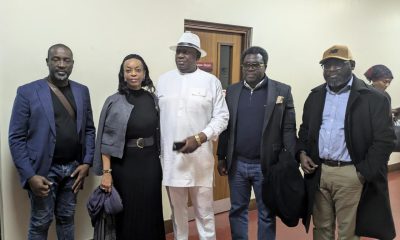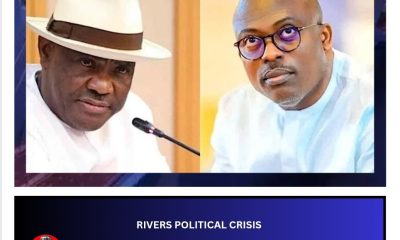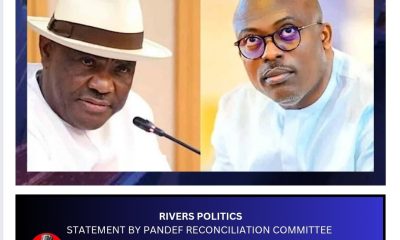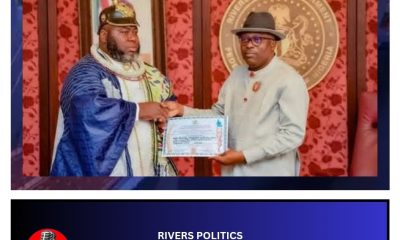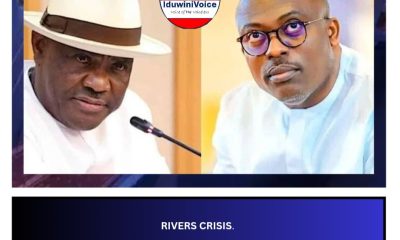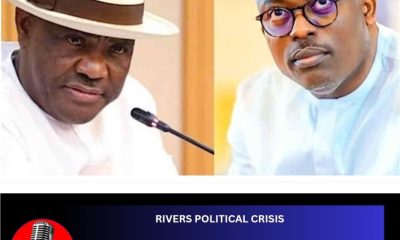Advert
Ijaw Leaders to Meet, Consider Status Following Rivers State Emergency Rule
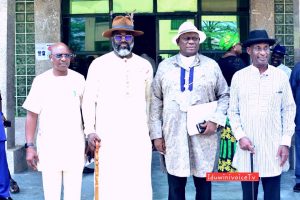
By Divine Perezide
The recent state of emergency declared in Rivers State by President Bola Tinubu has reignited discussions among the Ijaw ethnic group summon an extraordinary expanded Executive Council Meeting in Izon-Ware, Yenagoa. The meeting is billed to hold on March 26, 2025.
Speaking to Vanguard, Prof. Benjamin Okaba, President of the Ijaw National Congress (INC), expressed the Ijaw people’s disappointment over the development, describing it as yet another blow to their community.
> “For Ijaw people, we are not too happy because we see this as another slap on us. But again, our position will be deliberated upon in a wider stakeholders’ meeting that will be convened later.”
According to him, this upcoming meeting will allow the Ijaw people to assess their participation in Nigeria’s political structure and explore possible paths toward self-determination.
Criticism of Tinubu’s Decision
Okaba argued that the state of emergency was premature and that President Tinubu missed an opportunity to heed public calls to address the actions of Nyesom Wike, Minister of the Federal Capital Territory (FCT).
> “We say it is hasty because the President has so much opportunity to leverage on the calls made by Nigerians from all quarters to call his minister, Nyesom Wike, to order.”
He further accused Wike of being the main instigator of the political crisis in Rivers State, citing statements in which the minister allegedly vowed to obstruct Governor Siminalayi Fubara’s administration unless his demands were met.
> “Secondly, while Wike himself has been the antagonist, he had boldly stated that he would make governance impossible for the governor, Siminalayi Fubara, in as much as he does not dance to his tune.
“In a recent statement credited to him, he (Wike) said the two conditions he must meet are: ‘Allow him to control all the LGAs in Rivers State, and that he (Fubara) should sign an agreement that he would not contest in 2027.’”
Okaba described Wike’s actions as an attempt to dominate state resources and turn Rivers State into his personal domain, warning that the people would ultimately suffer the consequences.
Call for Wike’s Removal
Okaba criticized President Tinubu for allowing Wike to remain in office while Governor Fubara was sacked, calling it an unfair and imbalanced decision.
> “I said it is lopsided—why will you leave Wike and sack Sim? The best thing is to remove everybody who played a role in this.
“Wike has to be sacked, and all the federal appointees from the state also have to be sacked because if you do not sack them, they will use their positions to perpetrate more crises and create more advantageous roles for themselves.”
He also argued that Wike had long been preparing for an emergency rule scenario, using political and judicial maneuvers to trigger chaos in Rivers State.
> “The other issue in this state of emergency is that we have seen right from the beginning that the declaration was one of the options Wike was looking at. He felt if the judiciary cannot remove him quickly; if the House of Assembly could not take him off; then the next option is to create a chaotic situation so that an emergency can be imposed on the state.”
Legal and Political Reactions
Miakpor Emiaso, a retired Delta State Customary Court President, called the emergency declaration an unfortunate but inevitable decision. However, he pointed out political bias in the President’s speech.
> “Apart from a few underlying misgivings that I have, it was inevitable. I mean that something had to give way. The way the gladiators in Rivers State were going, we could not continue like that, ridiculing the entire government apparatus and even embarrassing the judiciary as a fallout.
“My misgivings are one; the president’s language declaring the state of emergency has some subtle political bias. If you noticed, the president never mentioned the name of the speaker in the broadcast, nor did he refer to the well-known external influence on the House of Assembly, which is the origin of this crisis.”
He further noted that Wike’s influence over Rivers politics had not been addressed in the emergency rule decision.
> “As it is now, the state of emergency seems to have given thumbs up for vaunting godfatherism because you could say that now that the president has gone this way, he has not mentioned the external influence, especially Wike, who is the origin of all these. This shows that he has a bias that he needs to cure.
“If the President wants to be viewed as fair, he should move Wike from where he is now; otherwise, Wike will not keep quiet. He will try to reach the administrator to influence him in one way or another.”
Additionally, he criticized the six-month duration of the emergency rule, arguing that it was excessive, especially given that a retired military officer had been appointed to oversee the state.
> “Again, I say that the six-month state of emergency is excessive. It is too long, especially when you drafted a retired military officer to run the state as an administrator.”
IYC’s Reaction to the Emergency Rule
Dr. Chris Ekyor, former Ijaw Youth Council (IYC) President, expressed shock over the declaration, suggesting that it made the President appear as if he was acting on Wike’s directives.
> “The state of emergency came to me as a rude shock. It gives the impression that the president is answerable to his minister.”
He also questioned the legality of the 27 lawmakers’ defection and its implications under the Electoral Act.
> “I’m concerned about how the judges ruled that the 27 members are legitimate members of the House after defecting and breaching the law. The real problem in Nigeria is the court delivering fair justice.”
According to Ekyor, if the judiciary had acted impartially, the Rivers crisis would have been resolved long before escalating to this level.
He further condemned Wike’s alleged disrespect toward the Ijaw people.
> “Wike left the issues and threatened the entire Ijaw people over a mere disagreement with his candidate, who became governor of Rivers State. How does that concern the rest of the Ijaw people?
“He insulted Ijaw in Abuja at a media parley. Then he came to the heart of Ijaw land, shot at our women and children with tear gas, and further insulted us by asking, ‘How many dem dey?’”
Ekyor emphasized that the Ijaw people had deliberately avoided responding with violence to prevent further escalation, suggesting that Wike had manipulated events to push for emergency rule.
> “We did not respond with violence to allow peace to reign, knowing that his goal was to cause the president to declare a state of emergency in Rivers State.”
Comparing Past Precedents
Ekyor compared Tinubu’s handling of the Rivers crisis to past instances where no state of emergency was declared despite serious conflicts.
> “President Tinubu rebelled against the former president, Olusegun Obasanjo, between 2003 and 2007, as the governor of Lagos State. No state of emergency was declared on him. Under President Yar’Adua, Atlas Cove was blown in 2009; no state of emergency in Lagos?”
He also questioned the reasoning behind blaming Governor Fubara for recent security incidents, suggesting that the Joint Task Force (JTF) should have been able to prevent such occurrences.
> “How did the president conclude that Fubara is behind the explosions in Rivers State? Why does he not think it is those fighting him? Is there no Joint Task Force, JTF, securing the pipelines anymore? Why is the government spending heavily on pipeline security? Is there any breakdown of law and order in the state to warrant what the president did?”
With tensions rising, Ijaw leaders have vowed to continue discussions on their future in Nigeria and the possibility of self-determination.
Advert
Comr. Solomon Gbegha Felicitates Rt. Hon. Franc Enekorogha on Birth Anniversary
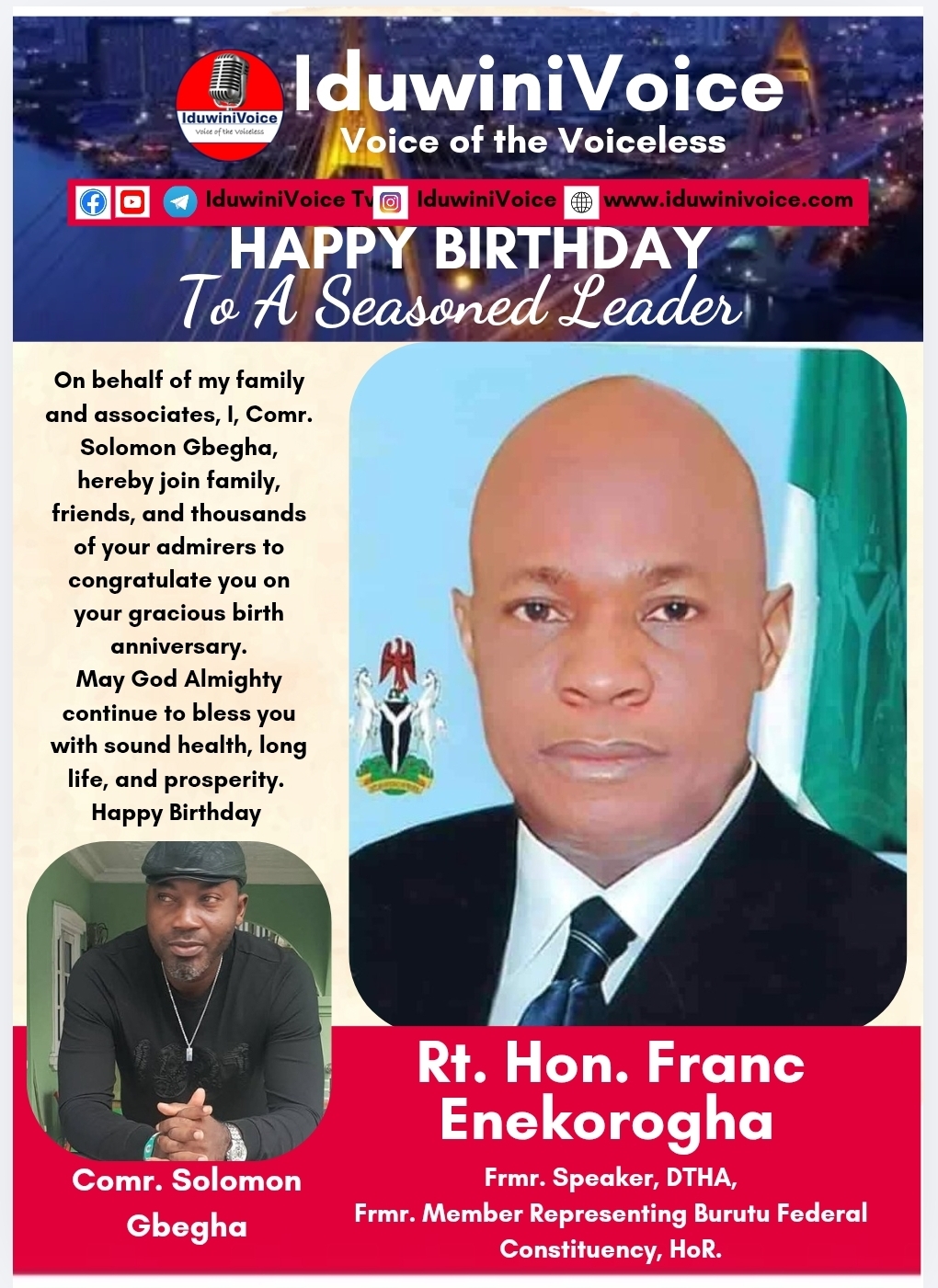
By Derick Peretengboro
A community leader and businessman, Comrade Solomon Gbegha, has extended warm birthday wishes to a celebrated personality and seasoned political figure, and mentor, Rt. Hon. Franc Pinapinawei Enekorogha, former Speaker of the Delta State House of Assembly, and former Honourable Member Representing Burutu Federal Constituency, House of Representatives, Abuja, on the occasion of his gracious birth anniversary.
In a congratulatory message made available to IduwiniVoicenewsdesk, Comr. Gbegha joined family members, friends, and admirers of the celebrant to mark the special day with prayers and goodwill.
According to the statement, “On behalf of my family and associates, I, Comr. Solomon Gbegha, hereby join family, friends, and thousands of your admirers to congratulate you on your gracious birth anniversary.
May God Almighty continue to bless you with sound health, long life, and prosperity.
Happy Birthday.”
The message reflects the deep appreciation and goodwill of Comr. Gbegha and his associates towards the celebrant, who have produced many political and social giants across Delta State, while wishing him continued divine blessings, good health and enduring success.
Advert
IYC Western Zone Information Officer to Lead Digital Skills Bootcamp for Ijaw Youths
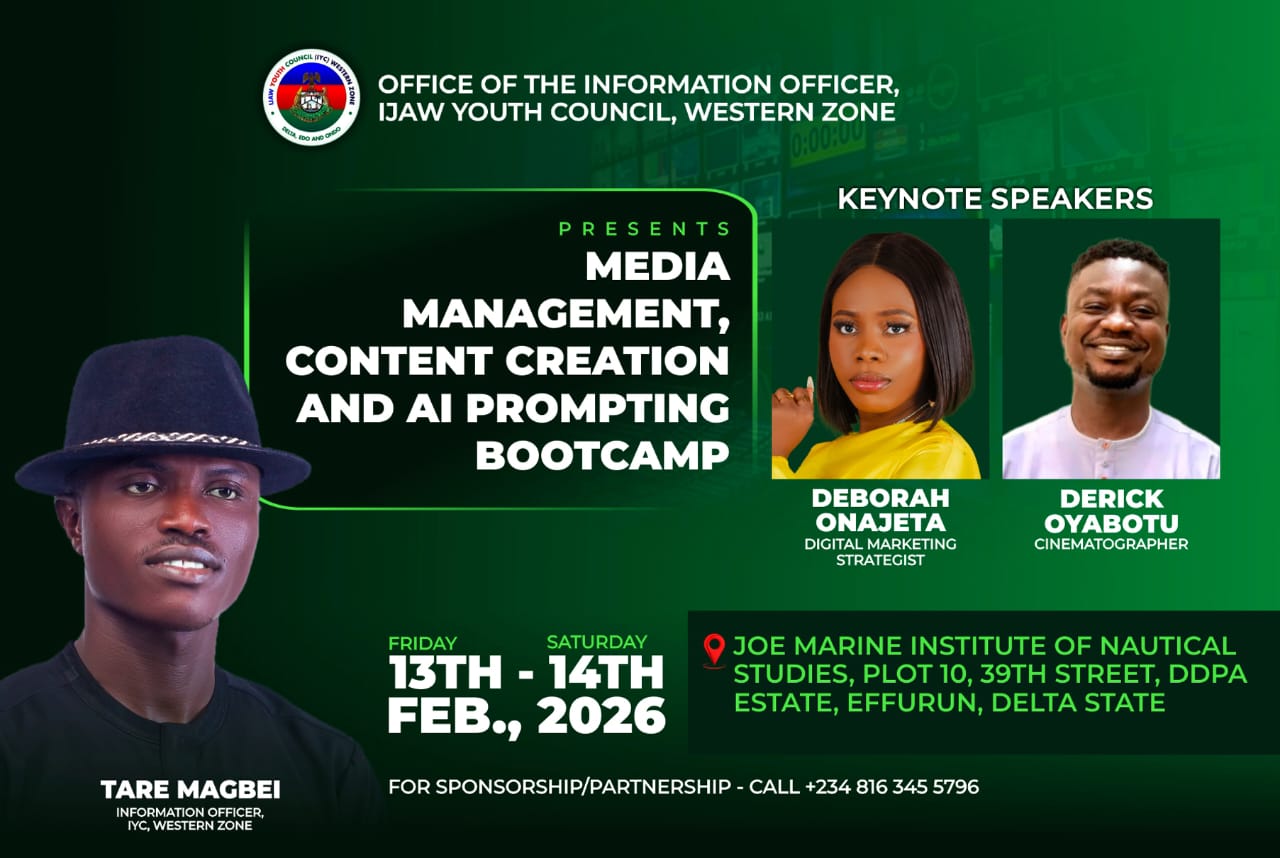
By Divine Perezide
The Information Officer of the Ijaw Youth Council (IYC), Western Zone, Comrade Tare Magbei, has announced plans to organise a two-day digital capacity-building programme targeted at young people across the zone.
The training, titled Media Management, Content Creation and AI Prompting Bootcamp, is scheduled to take place from February 13 to 14, 2026, and is aimed at building practical skills in media, digital communication and emerging technologies for Ijaw youths.
According to the organisers, the bootcamp will focus on strengthening young people’s ability to engage in advocacy, storytelling and community mobilisation through modern media tools.
About 50 participants are expected to benefit from the hands-on sessions, which will also introduce them to viable income-generating opportunities within the media and creative industries.
Beneficiaries will be selected from among Information Officers of the Ijaw Youth Council (IYC) in the Western Zone, alongside youths drawn from the 24 clans that constitute the zone.
The initiative, being driven by Comrade Magbei, is described as a strategic effort to enhance youth capacity, promote digital relevance and encourage the effective use of technology in today’s rapidly evolving media environment. It is also seen as a timely intervention to improve employability and strengthen advocacy among Ijaw youths across the Western Zone.
Advert
CLO Tantita, Akpos Seimode, Felicitates Engr. Matthew Tonlagha on 50th Birthday
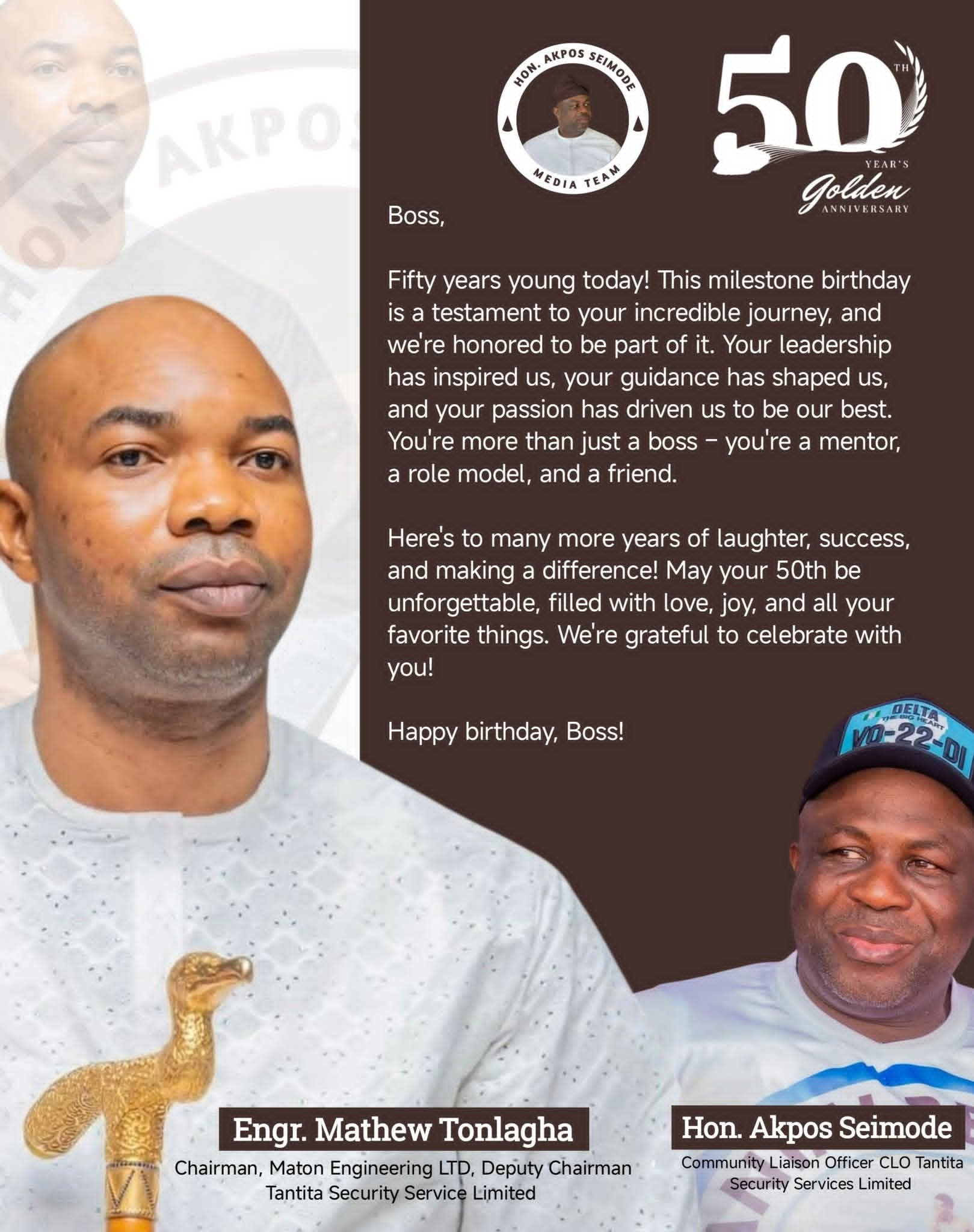
By Derick Peretengboro
The Community Liaison Officer (CLO) of Tantita Security Services Limited, Hon. Akpos Seimode, has congratulated the Deputy Chairman of Tantita Security Services Limited and Chairman of Maton Engineering Limited, Engr. Matthew Tonlagha, on the occasion of his 50th birthday anniversary.
In a goodwill message released to mark the celebration, Hon. Akpos hailed the business executive, stating: “HAPPY GOLDEN JUBILEE BIRTHDAY, BOSS!”
According to the statement, “The Community Liaison Officer, CLO Tantita, Hon. Akpos Seimode, hails deputy chairman Tantita Security Service Limited, cum chairman Maton engineering LTD, Engr. Matthew Tonlagha on his 50th birthday anniversary.”
Describing the celebrant’s personality and impact, Hon. Akpos said, “Matthew Tonlagha is a humble and distinguished son of the Izon Nation,” while praising his “visionary leadership and philanthropic contributions to society.”
He further noted that the celebrant’s leadership approach remains a source of encouragement to many communities, stressing that “his leadership style continues to inspire hope and unity across communities,” and describing him as “a bridge-builder who leads with humility.”
Hon. Akpos also offered prayers and best wishes to the celebrant, saying he wished him “good health, joy, and continued grace as he celebrates the Golden Jubilee.”
He concluded the message with the words: “Happy birthday once again, boss.”

